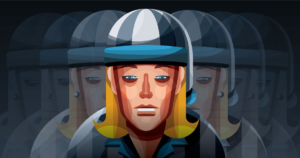Sleep Hypnosis for the Struggling Sleeper
Trouble sleeping? You’re not aloneーmany people struggle to catch a good night’s rest on a regular basis
Sleep Struggles
35% of adults don’t get the recommended seven hours of sleep per night
Insomnia
Sleep disorder related to difficulties in falling and/or staying asleep
30% of adults experience some type of insomnia
Forms of insomnia:
Acute: Brief and isolated instances
Chronic: Long term sleep difficulties (at least 3 nights a week for at least 3 months)
Comorbid: Linked to another mental or physical condition
Onset: Difficulty falling asleep at the beginning of the night
Maintenance: Difficulty staying asleep
Common causes:
Stress: Work, education, trauma, etc.
Poor sleep habits: Irregular sleep schedule, naps, etc.
Travel or work schedules: Disrupts sleep cycle
Diagnosed mental health disorders: Depression, anxiety, etc.
Diet: Eating too much before bed in the evening can be physically discomforting
Sleeping medication can be beneficial, but there are also significant drawbacks. Potential side effects include:
Dependence
Headache and dizziness
Drowsiness
Memory and performance problems
Prescription sleep aids don’t have to be the first step to better sleep
Hypnosis techniques can be used for much more than stage tricksーthey are also catching on as a guided remedy to aid sleep
Sleep Hypnosis
Hypnosis refers to a shifted mental state following an induction procedure centered on focused attention and absorption
— Change behavior through suggestibility
— Used to help treat of psychological disorders
Most studies conducted on effect of hypnosis on sleep have positive results
58.3% beneficial
12.5% mixed results
29.2% not beneficial
Hypnotherapy
Hypnosis treatment emphasizes suggestion, reeducation, or analysis
Hypnotherapy can be used for issues such as:
— Psychological trauma
— Anxiety and stress
— Depression
— Smoking cessation
— Sleep disorders
Hypnotic suggestion has a measurable impact on sleep in controlled settings
81% increase in deep sleep
67% decrease in time spent awake
People are not equally affected
Hypnosis success is partially determined by how susceptible people are to the process
Hypnotic suggestibility by drowsiness induced by hypnosis in a study of 124 volunteers:
17% unresponsive
35% slight
25% moderate
23% heavy
Sleep hypnosis process example:
Create a comfortable and calm environment to sleep
Clear the mind through relaxation
Release tension across the entire body
Conduct deep breathing exercises
Visualize and focus on a calm and relaxed place
Sleep hypnosis resources
Youtube Channels
Jody Whiteley: Guided meditation, sleep hypnosis, and sleep music
Michael Sealey: Hypnotherapy, guided meditation, and sleep relaxation
UltraHypnosis: Extensive hypnosis channel hub with over 500 videos
Apps
Sleep Well Hypnosis: Daily 25 minute audio sessions to help reduce anxious thoughts
Sleep Deeply: Guided relaxation, positive thought pattern sessions, and nonverbal sleep tracks
Harmony Hypnosis: Combination of verbal and nonverbal hypnosis sessions to relax the listener
There are a host of other medication-free treatments for insomnia that may complement hypnosis and place the mind in a state of restfulness
Other Techniques for Falling Asleep
Autonomous Sensory Meridian Response (ASMR)
Certain videos and sounds cause “tingling” feelings of euphoria and relaxation known as the ASMR phenomenon
Common “trigger” sounds that survey respondents experience hearing to achieve ASMR
75%: Whispering
69%: Personal attention
64%: Crisp sounds (metallic foil, fingernail tapping, etc.)
53%: Slow movements
Reasons survey respondents use ASRM
98% relaxation technique
82% sleep aid
70% stress reduction
Cognitive Behavior Therapy for Insomnia (CBT-I)
CBT principles are based in several assertions
Unhelpful behavior and thought patterns contribute to psychological problems
There are strategies to cope with and change these patterns for the better
Very effective for comorbid insomnia
Up to 90% of chronic insomnia cases are comorbid
50 minute increase in total sleep time in a study on comorbid insomnia and chronic pain
CBT strategies can be found online or through professional CBT therapists
Common strategies for sleeping:
Stimulus control
Go to bed only when feeling tired
Do not use the bed for anything except sleep
Do not use the bed for actions such as reading or watching television
Sleep restriction
Set limits spent in bed regardless of actual time slept
Sets a more consistent sleep pattern
Faster times falling asleep and waking up
Relaxation techniques
Mental focus
Muscle relaxation
Breathing techniques
Before turning to medication for a fulfilling night of sleep, consider drug-free solutions such as sleep hypnosis and other effective alternative treatments
Additional Resources on Common Sleep Questions
How Many Hours of Sleep Should You Get?
How Much REM Sleep Do You Need?
Hypnosis for the Struggling Sleeper
Sleep Tips: The Complete Guide to a Better Night’s Sleep
What Is the Best Temperature for Sleep?
Sources:
https://www.cdc.gov/media/releases/2016/p0215-enough-sleep.html
https://www.webmd.com/sleep-disorders/guide/insomnia-symptoms-and-causes#1
https://sleepfoundation.org/insomnia/content/what-are-different-types-insomnia
http://www.dictionary.com/browse/hypnotherapy
https://www.mayoclinic.org/diseases-conditions/insomnia/symptoms-causes/syc-20355167
https://www.mayoclinic.org/diseases-conditions/insomnia/in-depth/sleeping-pills/art-20043959
https://www.ncbi.nlm.nih.gov/pmc/articles/PMC4015388/#B19
http://jcsm.aasm.org/ViewAbstract.aspx?pid=31194
https://www.merriam-webster.com/dictionary/hypnotherapy
http://www.asch.net/Public/GeneralInfoonHypnosis/HypnosisInPsychotherapyAndBehavioralMedicine.aspx
https://www.ncbi.nlm.nih.gov/pmc/articles/PMC4015388/#B19
https://www.researchgate.net/publication/254734029_The_distribution_of_susceptibility_to_hypnosis_in_a_student_population_A_study_using_the_Stanford_Hypnotic_Susceptibility_Scale
https://www.youtube.com/user/jodywhiteley/about
https://www.youtube.com/user/MichaelSealey/about
https://www.youtube.com/user/UltraHypnosis/about
http://hypnosisappstore.com/sleep-deeply/
https://sleep.org/articles/what-is-asmr/
https://www.ncbi.nlm.nih.gov/pmc/articles/PMC4380153/
http://www.apa.org/ptsd-guideline/patients-and-families/cognitive-behavioral.aspx
https://www.ncbi.nlm.nih.gov/pmc/articles/PMC4694188/
https://www.ncbi.nlm.nih.gov/pmc/articles/PMC4248667/#R40
http://www.sleepeducation.org/treatment-therapy/cognitive-behavioral-therapy

